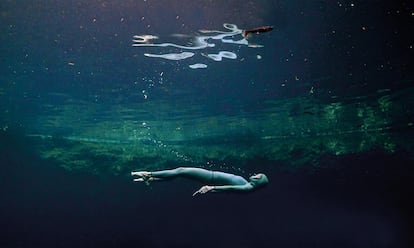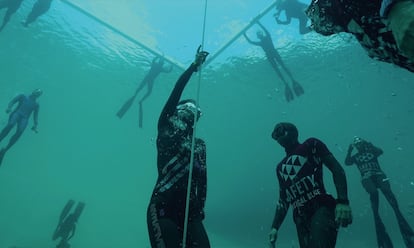Competitive freediving: between ecstasy and death
A captivating Netflix documentary tells the amazing story of champion Alessia Zecchini and her partner, Stephen Keenan

Childhood dreams often die in adolescence, but not always. Some persistently endure and transform into obsessions. Alessia Zecchini cannot pinpoint the exact moment when her passion for freediving started to control her life. Motivated by the desire to surpass the legendary Natalia Molchanova, who holds 40 world records and 22 world competition titles, Zecchini willingly faced demanding physical and athletic challenges. It also highlighted the gripping reality of putting her life on the line with each daring dive.
The Deepest Breath is a stunning Netflix documentary directed by Laura McGann. It follows the journey of an exceptional Italian freediver, woven in parallel with that of an Irishman named Stephen Keenan. Their seemingly separate paths eventually intersect through the twists and turns of life. Zecchini’s life was shaped by a chance encounter in a Roman pool and led to breathtaking natural wonders. But for Keenan, diving became solace during some of his darkest moments.
Keenan is a man who didn’t want an ordinary life, who dreamed of emulating British biologist David Attenborough, always searching and never finding. After traipsing around the world, Keenan comes to the realization that he simply needed to establish his own roots — a sense of stability and purpose — to find his place in the world. He rediscovers freediving, sets out to break records, opens a diving school in Egypt, and fully commits himself to ensuring the safety of those who choose to compete in dynamic apnea — the discipline of competitive freediving. This dangerous sport entails descending to extreme depths with no scuba tanks, and returning safely. Diving down beyond 300 feet and holding one’s breath is hard enough, but the ascent can be pure torment and sometimes deadly. It’s a unique blend of euphoria and danger, an experience of ecstasy overshadowed by the prospect of death. Many people lose consciousness and are at risk of drowning. This is when the safety team enters the scene, the life-saving guardian angels who accompany a freediver using scuba tanks. Their role is not without risk, as they need to make sure they have adequate decompression time before resurfacing. Very few athletes embrace vulnerability as deeply and frequently as Italian diver Alessia Zecchini, who constantly navigates the delicate balance between her ambition and fear of diving into the abyss.
A day after the documentary’s July 20th premiere on Netflix, Frenchman Arnaud Jerald set his eighth freediving world record by reaching a depth of 400 feet (122 meters) using only an ultra-light carbon monofin to propel him. This incredible feat took place during one of freediving’s most prestigious events — Vertical Blue — at the breathtaking Dean’s Blue Hole in The Bahamas. The documentary has several scenes in this dreamlike, natural hole in a bay west of Long Island, the world’s second deepest. The camera captures the turbulent ocean surface and then sharply shifts to the tranquil, suspended life on the journey to the dark abyss.

The documentary is already being compared to the Oscar-winning Free Solo, a documentary featuring rock climber Alex Honnold tackling El Capitan’s vertical 3,000-foot granite wall in Yosemite Valley (California) without a rope. The Deepest Breath skillfully weaves interviews with archival footage, and begins with a conversation in a car driven by Alessia Zecchini, who is heading to the ocean. Zecchini is describing her connection with death, her clear eyes reflected in the rearview mirror. In the next shot, those eyes appear lifeless, spinning in their sockets, desperately seeking air like her oxygen-starved lungs. Among elite freedivers, syncopes are common occurrences caused by insufficient oxygen reaching the brain. The documentary then reveals the potential for irreversible lung damage from repeated deep dives.
Natalia Molchanova, the undisputed queen of freediving, disappeared in the water near Formentera (the smallest of Spain’s Balearic Islands) in 2015 during a recreational diving session. She was 53 years old, and her body was never recovered. Her son, also a champion freediver, would have also died if Stephen Keenan hadn’t been there to save him. This led him to become a key safety officer in top global competitions, which is where he met Zecchini and played a significant role in shaping her into a world record holder. One challenge led to another, and Zecchini eventually surpassed Molchanova. But she left Zecchini with one final challenge: traversing the submerged rock arch of the Blue Hole in Dahab, Egypt. It’s a place with many tragedies, considered by some to be even more dangerous than Mt. Everest.
Filmmaker Luc Besson, director of The Big Blue (1987), a heavily fictionalized story of the rivalry between freedivers Enzo Molinari and Jacques Mayol, surely believed that reality could outdo his wildest imagination. Laura McGann has proven it with The Deepest Breath.
Sign up for our weekly newsletter to get more English-language news coverage from EL PAÍS USA Edition
Tu suscripción se está usando en otro dispositivo
¿Quieres añadir otro usuario a tu suscripción?
Si continúas leyendo en este dispositivo, no se podrá leer en el otro.
FlechaTu suscripción se está usando en otro dispositivo y solo puedes acceder a EL PAÍS desde un dispositivo a la vez.
Si quieres compartir tu cuenta, cambia tu suscripción a la modalidad Premium, así podrás añadir otro usuario. Cada uno accederá con su propia cuenta de email, lo que os permitirá personalizar vuestra experiencia en EL PAÍS.
¿Tienes una suscripción de empresa? Accede aquí para contratar más cuentas.
En el caso de no saber quién está usando tu cuenta, te recomendamos cambiar tu contraseña aquí.
Si decides continuar compartiendo tu cuenta, este mensaje se mostrará en tu dispositivo y en el de la otra persona que está usando tu cuenta de forma indefinida, afectando a tu experiencia de lectura. Puedes consultar aquí los términos y condiciones de la suscripción digital.









































